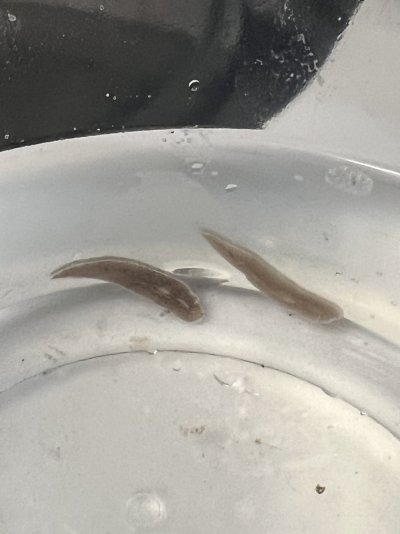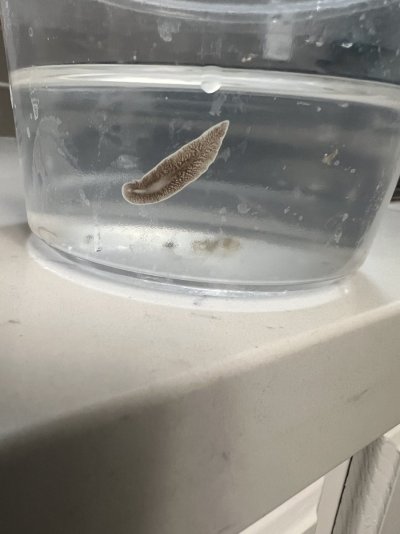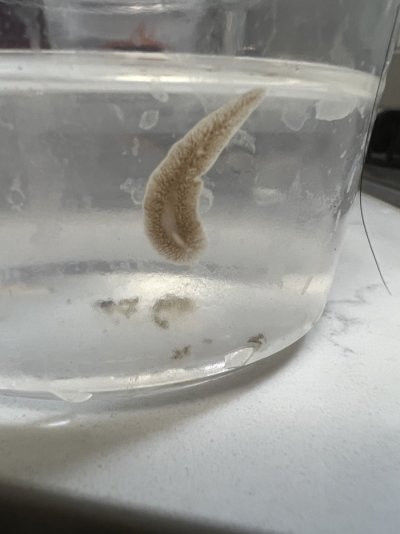Navigation
Install the app
How to install the app on iOS
Follow along with the video below to see how to install our site as a web app on your home screen.
Note: This feature may not be available in some browsers.
More options
You are using an out of date browser. It may not display this or other websites correctly.
You should upgrade or use an alternative browser.
You should upgrade or use an alternative browser.
Flatworm ID
- Thread starter ccole
- Start date
- Tagged users None
They do look like polyclad flatworms to me (though I'm not sure which species) - they're most likely ones that you would want to remove from your tank though.
I’m fairly certain they’re eating the gonis. Multiple of my colonies have been on the decline. Does anyone know if they’re able to reproduce in my tank?
I have a leopard and a melanarus wrasse they’ve managed to escape. These ones looked too big for them.
I have a leopard and a melanarus wrasse they’ve managed to escape. These ones looked too big for them.
There is a good chance they may be able to reproduce, as many polyclad flatworms hatch as fully-formed juveniles rather than pelagic larvae. These kinds of flatworms are also usually pretty good at avoiding predation because they tend to crawl around inside of and live in the rockwork of the tank.I’m fairly certain they’re eating the gonis. Multiple of my colonies have been on the decline. Does anyone know if they’re able to reproduce in my tank?
I have a leopard and a melanarus wrasse they’ve managed to escape. These ones looked too big for them.
For some good examples, you can search on here for info on leopard flatworms, which people have pop up again in their tank long after removing the ones they can find.
Thank you for the information. When I first got my live rock two years ago, I found two decent sized leopard polyclad flatworms and removed them immediately. I read that they often responsible for killing snails but I haven’t really struggled keeping snails alive. Is it possible that these can eat coral rather than snails? I have had random coral death in the past from colonies that had been healthy and growing.There is a good chance they may be able to reproduce, as many polyclad flatworms hatch as fully-formed juveniles rather than pelagic larvae. These kinds of flatworms are also usually pretty good at avoiding predation because they tend to crawl around inside of and live in the rockwork of the tank.
For some good examples, you can search on here for info on leopard flatworms, which people have pop up again in their tank long after removing the ones they can find.
- Joined
- Mar 16, 2018
- Messages
- 207
- Reaction score
- 251
You would be surprised by the melanarus. Mine violently thrashes food pieces against the rock to break them. Mine is about 5 inches long now but he can eat chunks of food the size of a cleaner shrimp no problem.I’m fairly certain they’re eating the gonis. Multiple of my colonies have been on the decline. Does anyone know if they’re able to reproduce in my tank?
I have a leopard and a melanarus wrasse they’ve managed to escape. These ones looked too big for them.
Yeah, depending on the species, they might eat snails, clams, corals, barnacles, etc.Thank you for the information. When I first got my live rock two years ago, I found two decent sized leopard polyclad flatworms and removed them immediately. I read that they often responsible for killing snails but I haven’t really struggled keeping snails alive. Is it possible that these can eat coral rather than snails? I have had random coral death in the past from colonies that had been healthy and growing.
Looks like Eefw.. I found some on a torch I had and they were having a field day with it! Start looking for eggs and scraping them off out of the tank obviously and dip your corals “and turkey baste” every few days and they will be gone.. they’re def not as bad as aefw..
Attachments
Those do look very similar! The ones I have seem to specialize in eating Gonis. I'll check my euphyllia as well though, just in case.Looks like Eefw.. I found some on a torch I had and they were having a field day with it! Start looking for eggs and scraping them off out of the tank obviously and dip your corals “and turkey baste” every few days and they will be gone.. they’re def not as bad as aefw..
Similar threads
- Replies
- 9
- Views
- 186
TOP 10 Trending Threads
- Replies
- 24
- Views
- 139
New Posts
-
-
SBB - AFTERPARTY SALE- 3 day event 1750 corals. Our Largest sale ever!
- Latest: SBB Corals





















